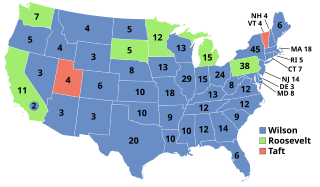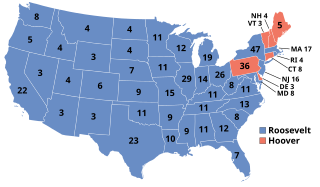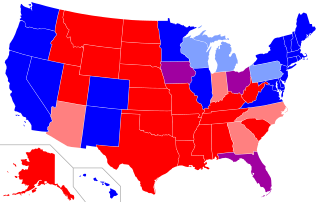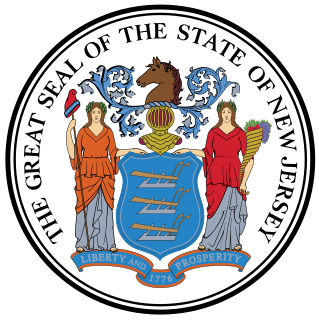
The 2000 United States presidential election was the 54th quadrennial presidential election. It was held on Tuesday, November 7, 2000. Republican candidate George W. Bush, the Governor of Texas and the eldest son of the 41st President George H. W. Bush, won the election by defeating Democratic nominee Al Gore, the incumbent vice president. It was the fourth of five presidential elections in which the winning candidate lost the popular vote, and is considered one of the closest elections in US history.

The 1996 United States presidential election was the 53rd quadrennial presidential election. It was held on Tuesday, November 5, 1996. Incumbent Democratic President Bill Clinton defeated former Senate Majority Leader Bob Dole, the Republican nominee, and Ross Perot, the Reform Party nominee.

The 1860 United States presidential election was the nineteenth quadrennial presidential election to select the President and Vice President of the United States. The election was held on Tuesday, November 6, 1860. In a four-way contest, the Republican Party ticket of Abraham Lincoln and Hannibal Hamlin emerged triumphant. The election of Lincoln served as the primary catalyst of the American Civil War.

The United States presidential election of 1904 was the 30th quadrennial presidential election, held on Tuesday, November 8, 1904. Incumbent Republican President Theodore Roosevelt defeated the Democratic nominee, Alton B. Parker. Roosevelt's victory made him the first president to win a term in his own right after having ascended to the presidency upon the death of a predecessor.

The United States presidential election of 1908 was the 31st quadrennial presidential election, held on Tuesday, November 3, 1908. Secretary of War and Republican Party nominee William Howard Taft defeated three-time Democratic nominee William Jennings Bryan.

The United States presidential election of 1912 was the 32nd quadrennial presidential election, held on Tuesday, November 5, 1912. Democratic Governor Woodrow Wilson of New Jersey unseated incumbent Republican President William Howard Taft and defeated former President Theodore Roosevelt, who ran as the Progressive Party nominee. Roosevelt remains the only third party presidential candidate in U.S. history to finish better than third in the popular or electoral vote.

The United States presidential election of 1916 was the 33rd quadrennial presidential election, held on Tuesday, November 7, 1916. Incumbent Democratic President Woodrow Wilson defeated Supreme Court Justice Charles Evans Hughes, the Republican candidate. Wilson was the only sitting Democratic president to win re-election between 1832 and 1936.

The United States presidential election of 1920 was the 34th quadrennial presidential election, held on Tuesday, November 2, 1920. In the first election held after the end of World War I and the ratification of the Nineteenth Amendment, Republican Senator Warren G. Harding of Ohio defeated Democratic Governor James M. Cox of Ohio.

The United States presidential election of 1928 was the 36th quadrennial presidential election, held on Tuesday, November 6, 1928. Republican Secretary of Commerce Herbert Hoover defeated the Democratic nominee, Governor Al Smith of New York. Hoover was the last Republican to win a presidential election until 1952.

The United States presidential election of 1932 was the thirty-seventh quadrennial presidential election, held on Tuesday, November 8, 1932. The election took place against the backdrop of the Great Depression. Incumbent Republican President Herbert Hoover was defeated in a landslide by Democrat Franklin D. Roosevelt, the Governor of New York. The election marked the effective end of the Fourth Party System, which had been dominated by Republicans.

The United States presidential election of 1936 was the thirty-eighth quadrennial presidential election, held on Tuesday, November 3, 1936. In the midst of the Great Depression, incumbent Democratic President Franklin D. Roosevelt defeated Republican Governor Alf Landon of Kansas. Roosevelt won the highest share of the popular and electoral vote since the largely uncontested 1820 election. The sweeping victory consolidated the New Deal Coalition in control of the Fifth Party System.

The 1944 United States presidential election was the 40th quadrennial presidential election. It was held on Tuesday, November 7, 1944. The election took place during World War II. Incumbent Democratic President Franklin D. Roosevelt defeated Republican Thomas E. Dewey to win an unprecedented fourth term.

The 1972 United States presidential election was the 47th quadrennial presidential election. It was held on Tuesday, November 7, 1972. Incumbent Republican President Richard Nixon defeated Democratic Senator George McGovern of South Dakota.

Since the 2000 United States presidential election, red states and blue states have referred to states of the United States whose voters predominantly choose either the Republican Party (red) or Democratic Party (blue) presidential candidates. Since then, the use of the term has been expanded to differentiate between states being perceived as liberal and those perceived as conservative. Examining patterns within states reveals that the reversal of the two parties' geographic bases has happened at the state level, but it is more complicated locally, with urban/rural divides associated with many of the largest changes.

The 2004 United States presidential election was the 55th quadrennial presidential election, held on Tuesday, November 2, 2004. Incumbent Republican President George W. Bush defeated Democratic nominee John Kerry, a United States Senator from Massachusetts.

In the United Kingdom (UK), each of the electoral areas or divisions called constituencies elect one member to a parliament or assembly, with the exception of European Parliament and Northern Ireland Assembly constituencies which are multi member constituencies.
Oxfordshire County Council is elected every four years.

Elections in New Jersey are authorized under Article II of the New Jersey State Constitution, which establishes elections for the governor, the lieutenant governor, and members of the New Jersey Legislature. Elections are regulated under state law, Title 19. The office of the New Jersey Secretary of State has a Division of Elections that oversees the execution of elections under state law. In addition, the New Jersey Election Law Enforcement Commission (ELEC) is responsible for administering campaign financing and lobbying disclosure.

The 2012 United States presidential election was the 57th quadrennial American presidential election, held on Tuesday, November 6, 2012. The Democratic nominee, President Barack Obama, and his running mate, Vice President Joe Biden, were elected to a second term. They defeated the Republican ticket of businessman and former Governor Mitt Romney of Massachusetts and Representative Paul Ryan of Wisconsin.

Essex is a county in the south-east of England, north-east of London. One of the home counties, it borders Suffolk and Cambridgeshire to the north, Hertfordshire to the west, Kent across the estuary of the River Thames to the south, and London to the south-west. The county town is Chelmsford, the only city in the county. For government statistical purposes Essex is placed in the East of England region.



















